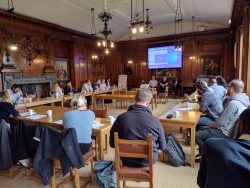Date: 17/06/2022
As the academic calendar comes to an end, the ‘Reinvigorating Area Studies: A DTP Training Event for ESRC and non-ESRC Students’ provided a perfect environment to engage with recent developments within the Area Studies pathway. Hosted by the Global Languages-Based Area Studies pathway, Wales Doctoral Training Partnership, with support from the South Coast DTP and the Midlands Graduate School, the two-day conference was held at the University of Cardiff, 6-7 June. There were excellent papers demonstrating various innovative applications of Area Studies, an interesting discussion on emerging trends in Area Studies, a Research ‘Surgery’, a Methods Café where staff offered research methods advice under methodological themes including the applications of qualitative research, deep learning in social science, social media usage, a postdoc Q&A, and lots of networking opportunities in the breaks. ‘I was particularly impressed by the various ontological perspectives of ‘Area Studies’ applications across the DTPs (i.e., from sub-regional entities and villages to global and regional institutions)’ reports postdoctoral fellow David Alemna. David notes, ‘Being a part of the quantitative research methods panel also allowed me to learn from the experiences of other students, as well as share some of my experiences’. David also presented in the ‘Being a Post Doc, Careers in and out of Academia’ session, reflecting on his experience and journey in academia.

Final year PhD student, Nandor Revesz, was ‘thrilled to (re)connect with fellow DTP members in person and to see the wide scope of innovative Area Studies research taking place within the organising DTPs’. Fellow student, Patience Manhovo, found it ‘great to learn and engage with various issues affecting area studies globally in a single event and also to learn how different methodologies are being applied in researching those contexts’. The atmosphere was relaxed and attendees enjoyed the campus facilities. ‘I personally found it refreshing to attend a conference and present my research to a live audience after two years of lockdowns and studying in isolation’ says Patience, ‘I developed further presentation skills and am currently revising aspects of my research theoretical framework as a result of watching and listening to other students presenting their research. … It was akin to group supervision where we could all learn from each other’s challenges’.